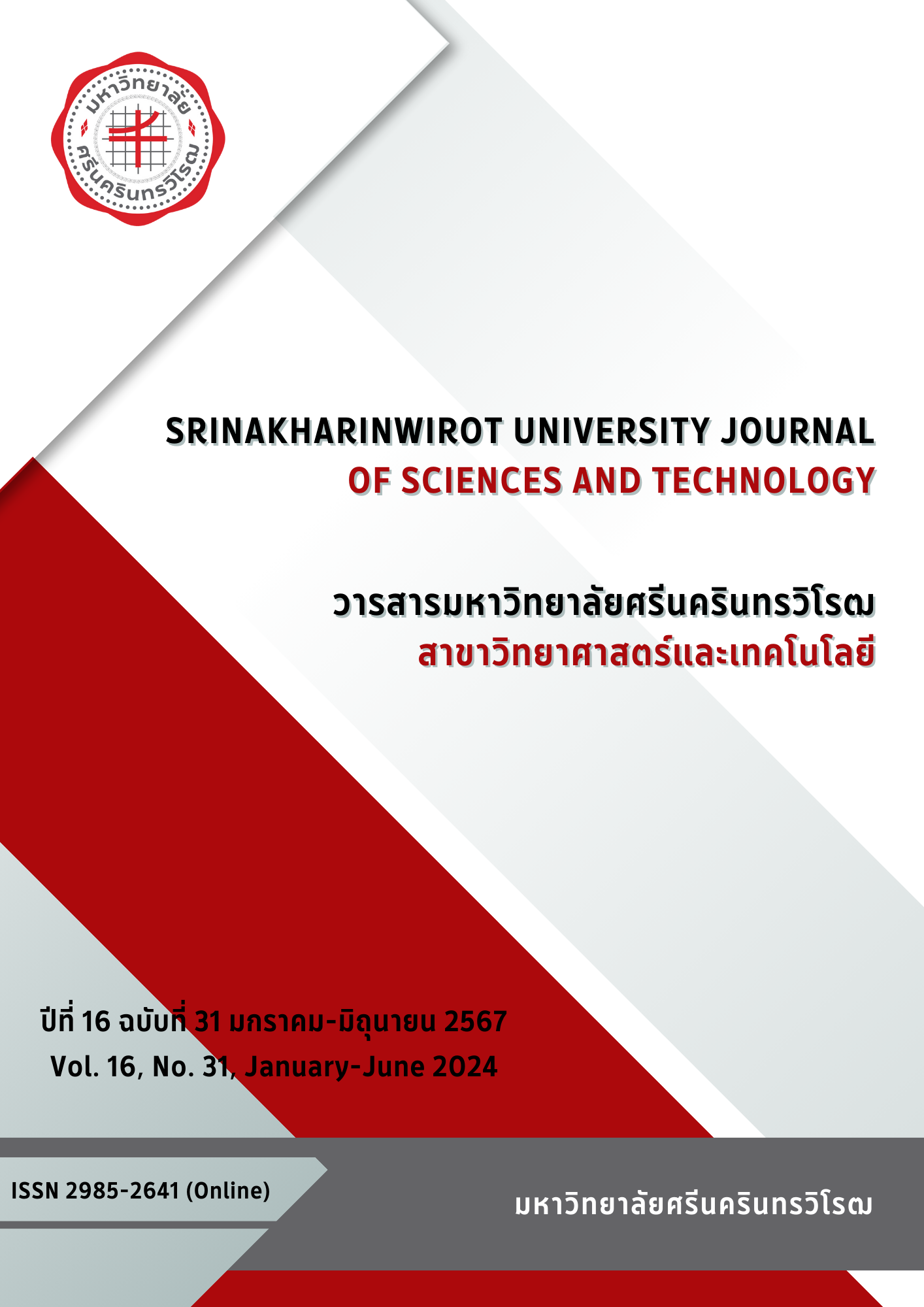THE DEVELOPMENT OF A DEPRESSION RISK ANALYSIS MODEL USING ONLINE SOCIAL NETWORK DATA
Keywords:
Depression, Social Network, Risk Analysis ModelAbstract
The number of people with depression is constantly increasing. Depressed people are not treated and express behavior via social network posts. Thus, a depression risk analysis model is proposed using online social network data. This research collects data from the patient depression questionnaire (PHQ-9) and Twitter comment data. The Twitter data is collected from 405 Twitter users, 178 depressed people and 114 regular people. A hybrid machine learning technique is applied as the model construction and compared with four machine learning techniques Support Vector Machine, Naïve Bayes, Decision Tree, Deep Learning, Random Forest. The experimental results revealed that Hybrid machine learning technique achieved higher F-measure than other machine learning techniques. Moreover, the results indicated that the appropriate attributes for modeling in this research were all features which consisted of Demographic Characteristics, Twitter User's Information, Text, and Emoticons.
Downloads
References
Hongsrisuwan, N. (2016). Depression. HCU Journal of Health Science, 19(38), 105-118.
The Excellence Center for Depression Disorder. (2017). Knowledge and essence about depression, World Health Day 2017. Depression: Let's talk. pp. 1-2.
WHO. (2021). Depression. Retrieved from https://www.who.int/news-room/factsheets/detail/depression
Tawichsri, T., and Sa-ngimnet, B. (2021). Mental health problems in Thailand during the Covid-19 crisis from the perspective of an economist (aBRIDGEd No. 8/2021). Puey Ungphakorn Institute for Economic Research. Retrieved from https://www.pier.or.th/abridged/2021/08/
Department of Mental Health. (2021). Strategic Plan for the Department of Mental Health during the 12th National Economic and Social Development Plan (2017-2021). Mental Health Strategy Department of Mental Health. pp. 19-20.
Institute for Population and Social Research Mahidol University. (2017). Thai health report 2560. Bangkok, Thailand: Amarin Printing & Publishing Public Company Limited. pp. 88-89.
Phanichsiri, K., and Tuntasood, B. (2016). Social Media Addiction and Attention Deficit and Hyperactivity Symptoms in High School Students in Bangkok. Journal of the Psychiatrist Association of Thailand, 6(13), 191-204.
Choudhury, M., Counts, S., and Horvitz, E. (2013). Social media as a measurement tool of depression in populations. In Proceedings of the 5th Annual ACM Web Science Conference (WebSci '13), pp. 47-56. New York, USA: ACM.
Barhan, A., and Shakhomirov, A. (2012). Methods for sentiment analysis of twitter messages. In: Proceedings of the 12th Conference of Fruct Association, pp. 215-222.
Sood, A., Hooda, M., Dhirn, S., and Bhatia, M. (2018). An initiative to identify depression using sentiment analysis: A machine learning approach. Indian Journal of Science and Technology, 11, 1-20.
Park, M., Cha, C., and Cha, M. (2012). Depressive moods of users portrayed in Twitter. In Proceedings of the ACM SIGKDD Workshop on Healthcare Informatics (HI-KDD). pp. 183-195. Beijing, China: ACM.
Orabi, H. A., Buddhitha, P., Orabi, H. M., and Inkpen, D. (2018). Deep Learning for Depression Detection of Twitter Users. In Proceedings of the Fifth Workshop on Computational Linguistics and Clinical Psychology: From Keyboard to Clinic, pp. 88-97. New Orleans, Louisiana.
Aldarwish, M., and Ahmad, H. (2017). Predicting Depression Levels Using Social Media Posts, In IEEE 13th International Symposium on Autonomous Decentralized System (ISADS), pp. 277-280. Bangkok, Thailand.
Hu, Q., Li, A., Heng, F., Li, J., and Zhu, T. (2015). Predicting Depression of Social Media User on Different Observation Windows. In Proceedings of IEEE/WIC/ACM International Conference on Web Intelligence and Intelligent Agent Technology (WI-IAT), pp. 361-364. Singapore.
Hootsuite. (2019). Digital 2019 Thailand : Social Media Audiences Quarterly Growth. Retrieved from https://www.slideshare.net/DataReportal/digital-2019-thailand-january-2019-v01
Suntaphun, P., Bussahong, S., and Srisoem, C. (2019). Adolescent Depression: Nursing Roles. Kuakarun Journal of Nursing, 26(1), 187-199.
Nielsen, J., and Landauer, T. K. (1993). A mathematical model of the finding of usability problems. In Proceedings of the INTERACT'93 and CHI'93 Conference. pp. 206-13.
Public Relations Department of Mental Health. (2018). Depression Assessment (9Q). Retrieved from https://www.dmh.go.th/test/download/files/2Q%209Q%208Q%20(1).pdf
Mahittivanicha, N. (2020). Global social media usage statistics and behavior Q1. Retrieved from https://www.twfdigital.com/blog/2020/02/global-social-media-usage-stats-q1-2020/
Kralj Novak, P., Smailovic, J., Sluban, B., and Mozetic, I. (2015). Sentiment of Emojis. PLoS ONE, 10(12), e0144296. https://doi.org/10.1371/journal.pone.0144296
Vateekul, P., and Koomsubha, T. (2016). A study of sentiment analysis using deep learning techniques on Thai Twitter data. In Proceedings of 2016 13th International Joint Conference on Computer Science and Software Engineering (JCSSE). pp 1-6.
Islam, M. R., Kabir, M. A., Ahmed, A., Kamal, A. R. M., Wang, H., and Ulhaq, A. (2018). Depression detection from social network data using machine learning techniques. Health Information Science and Systems, 6(8), 1-12.
Hutto, C., and Gilbert, E. (2014). VADER: A parsimonious rule-based model for sentiment analysis of social media text. In Proceedings of the 8th International Conference on Weblogs and Social Media, ICWSM 2014, pp. 216-225. Ann Arbor, MI, USA.
Stephen, J. J., and Prabu, P. (2019). Detecting the magnitude of depression in Twitter users using sentiment analysis. International Journal of Electrical and Computer Engineering (IJECE), 9(4), 3247-3255. https://doi.org/10.11591/ijece.v9i4.pp3247-3255
Downloads
Published
How to Cite
Issue
Section
License
Copyright (c) 2024 Srinakharinwirot University Journal of Sciences and Technology

This work is licensed under a Creative Commons Attribution-NonCommercial-NoDerivatives 4.0 International License.
Srinakharinwirot University Journal of Sciences and Technology is licensed Under a Creative Commons Attribution-NonCommercial-NoDerivs 4.0 International (CC-BY-NC-ND 4.0) License, Unless Otherwise Stated. Please Read Journal Policies Page for More Information on Open Access, Copyright and Permissions.



